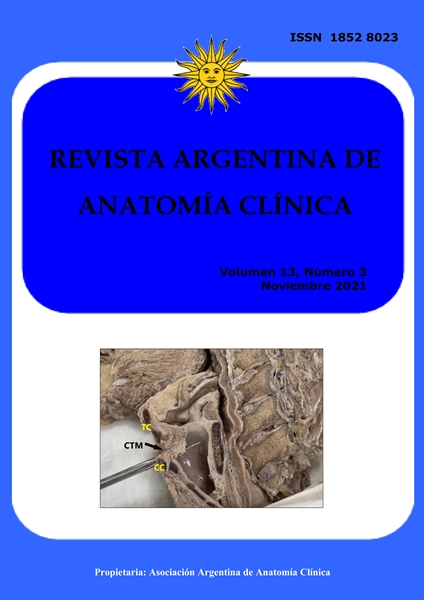Anatomical look at the olfactory tract and its relation with the thalamus
DOI:
https://doi.org/10.31051/1852.8023.v13.n3.34736Keywords:
Medialdorsal nucleus; Entorhinal cortex; olfaction.Abstract
The olfactory system is the one in charge of receiving sensory stimuli linked to the smell of substances. Its pathway begins in the bipolar Schultze cells in the olfactory mucosa and ends in the primary olfactory cortex, which includes the piriformis, amygdala, and peritonsillar cortex, and the other olfactory brain structures, including the entorhinal cortex, hippocampus, cortex. parahippocampal, thalamus, hypothalamus, orbitofrontal cortex, and insular cortex and their extension to the inferior lateral frontal region. The thalamus is a brain nucleus that fulfills a vital function of sensory regulation of the organism, intervening in a large number of mental processes that shape the way of perceiving and acting on the environment. The olfactory tract was long thought to be unrelated to the thalamus. Part of this thought came from the fact that the olfactory bulb presents its own thalamic equivalent of the same embryological derivation as this encephalic nucleus. However, the most current assertions show that the mediodorsal nucleus of the thalamus has numerous connections with the different olfactory structures that participate in the discrimination and learning of smell. Although these interactions imply a clear function of the thalamus, it is not an essential projection for this pathway. The thalamic equivalent, the interconnections of the granular and periglomerular interneurons of the olfactory bulb, accompanied by their cortical connection, are more than sufficient for the correct functioning of the olfactory pathway.
References
Adair D, Truong D, Esmaeilpour Z, Gebodh N, Borges H, Ho L, Bremner JD, Badran BW, Napadow V, Clark VP, Bikson M. 2020. Electrical stimulation of cranial nerves in cognition and disease, Brain Stimulation 13: 717-50.
Barrett KE, Barman SM, Boitano S, Brooks HL. 2016. Ganong, Fisiología Médica. 25ª edición, España: Editorial McGraw-Hill, pág: 218-19.
Bay HH, Cavdar S. 2013. Regional connections of the mediodorsal thalamic nucleus in the rat. Journal of integrative neuroscience 12: 201–19.
Courtiol E, Wilson DA. 2015. The olfactory thalamus. unanswered questions about the role of the mediodorsal thalamic nucleus in olfaction. Frontiers in neural circuits 9: 49.
Guillery RW. 1995. Anatomical evidence concerning the role of the thalamus in corticocortical communication: a brief review. Journal of anatomy 187: 583–92.
Hall JE. 2016. Guyton y Hall: Compendio de fisiología médica. 13a Edición, España: Editorial Elsevier, pag: 688-89.
Krettek JE, Price JL. 1977. The cortical projections of the mediodorsal nucleus and adjacent thalamic nuclei in the rat. The Journal of comparative neurology 171: 157–91.
Ongür D, Price JL. 2000. The organization of networks within the orbital and medial prefrontal cortex of rats, monkeys and humans. Cereb Cortex 10: 206-19.
Potter H, Butters N. 1980. An assessment of olfactory deficits in patients with damage to prefrontal cortex. Neuropsychologia 18: 621–28.
Price JL, Slotnick BM. 1983. Dual olfactory representation in the rat thalamus: an anatomical and electrophysiological study. The Journal of comparative neurology 215: 63–77.
Price JL, Slotnick BM, Revial MF. 1991. Olfactory projections to the hypothalamus. The Journal of comparative neurology 306: 447–61.
Sarnat HB, Flores-Sarnat L. 2019. Development of the human olfactory system. Handbook of clinical neurology 164: 29–45.
Shepherd GM. 2005. Perception without a thalamus how does olfaction do it?. Neuron 46: 166–68.
Splittgerber R. 2019. Snell Neuroanatomía Clínica. 8ª Edición, España: Editorial Wolters Kluwer, pág: 367.
Wang J, Eslinger PJ, Smith MB, Yang QX. 2005. Functional Magnetic Resonance Imaging Study of Human Olfaction and Normal Aging. The Journals of Gerontology Series A 60: 510–14.
Waxman SG. 2011. Neuroanatomía clínica. 26ª Edición, España: Editorial McGraw-Hill, pág: 229.
Downloads
Published
Issue
Section
License
Copyright (c) 2021 Melisa S. Gonzalez Abad, Juan A. Costa, Matias A. Perea, Gaston Tarantino

This work is licensed under a Creative Commons Attribution-NonCommercial 4.0 International License.
Authors retain copyright and grant the journal right of first publication with the work simultaneously licensed under a Creative Commons Attribution License that allows others to share the work with an acknowledgement of the work's authorship and initial publication in this journal. Use restricted to non commercial purposes.
Once the manuscript has been accepted for publications, authors will sign a Copyright Transfer Agreement to let the “Asociación Argentina de Anatomía Clínica” (Argentine Association of Clinical Anatomy) to edit, publish and disseminate the contribution.



